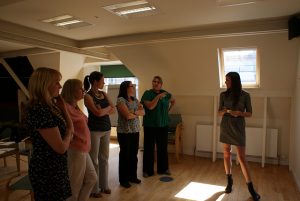Service Design for the festivals

Edinburgh Festivals are some of the finest cultural experiences in the world and we are working with them to explore what they can learn from Service Design. We are working closely with the Festivalslab; a unique programme of work which identifies and develops ways to improve the world's festival city - for audiences, for artists, for partners and for the festival organisations themselves.
Edinburgh Festivals are some of the finest cultural experiences in the world and we are working with them to explore what they can learn from Service Design. We are working closely with the Festivalslab; a unique programme of work which identifies and develops ways to improve the world’s festival city – for audiences, for artists, for partners and for the festival organisations themselves.
The project kicked off with a basic introduction to how Service Design tools are relevant to designing festival experiences as services. We spent the afternoon with the Science Festival Team – including the development manager, the business director, the marketing manager, the generation science manager and the deputy director.
Initially, we carried out small exploration exercises focused on seeing the world differently. Participants tried to book a festival ticket online and simultaneously wrote down a list of fifty things to capture the experience.

This was very simple yet revealed key insights into the experience of booking a festival ticket online: the site never shows me an alternative, I want to give up and phone, why do I need to create an account? why do they need so much information? why can’t you book tickets through the mobile application?
Participants described these exploration tools as a “great chance to think virtually”. One tool was designed to encourage thought experiments whilst walking around a public space. This resulted in metaphors around accessibility ; the festival offers multiple messages for multiple customers, and this metaphor encouraged thinking around who chooses what at what point. Why do people choose the events they do and how can we understand this better?
We spent time exploring personas as a way to provide the team with different perspectives on the services they offer. After building up clear pictures of typical characters who do engage with the festival the team created their own personas of people who do not engage with the service.

This exercise revealed assumptions around how and why people engage with the festival: “People decide they want to buy a ticket before hand and then invest a long time in booking”. Creating personas sparked off interesting debate around the barriers to engagement and how people seek advice and recommendations around what event to attend and why.
We then took these personas through a typical customer journey. This revealed lots of opportunities for innovation such as getting to and from events and the contrast between the touchpoints of an adults festivals experience to that of a child.

Relevance is a big theme for the festival staff and they are clearly facing all the challenges that come with moving away from traditional science education to a more modern representation of science. As well as balancing the breadth and depth of their program they are focusing on helping people navigate their festival. We discussed key questions such as: How can we build communities and loyalties throughout the year with all stakeholders? How can we truly combat the stigma of science? How can we actively seek out the voices of our audiences?

We are really excited about this project. In it’s small way it may very well be another revolution in how the cultural sector innovates in the UK. We intend to bring design thinking and doing to the festivals and showcase the notion of seeing festivals as service experiences.